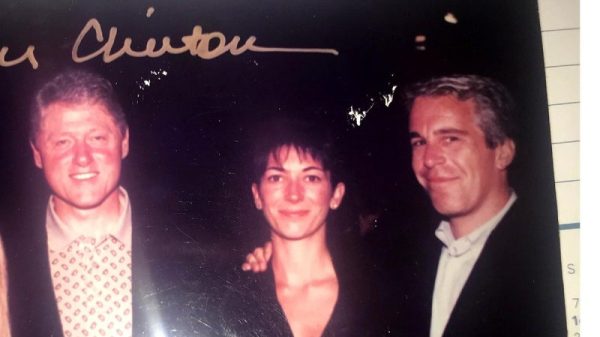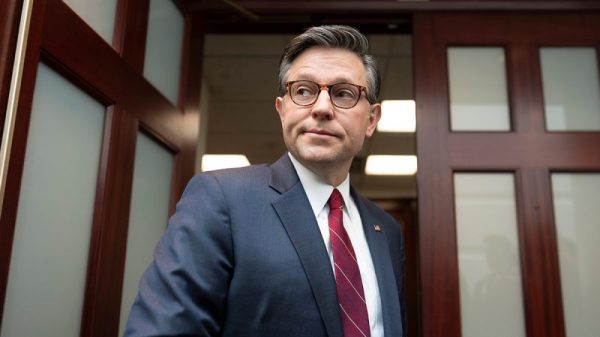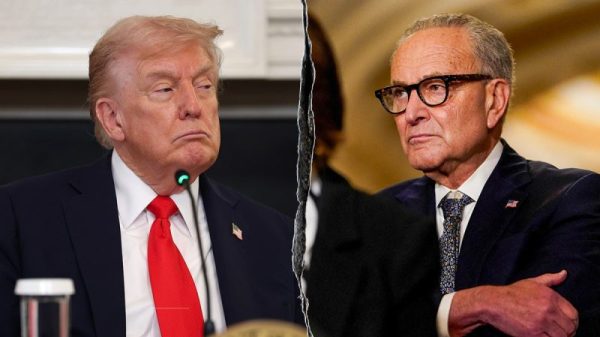A group of Hispanic conservative leaders sent a letter to Univision expressing support for its recent interview with former president Donald Trump, which has garnered growing criticism over its journalistic standards by a large and influential Spanish-language network ahead of next year’s presidential election.
The Nov. 7 interview also touched off a call to boycott the network and prompted the Congressional Hispanic Caucus, all of whose members are Democrats, to prepare a letter requesting a meeting with the network to discuss its journalism. That move is now drawing its own backlash from conservatives.
“If sent, this letter would constitute a direct attack on a free and independent press and a form of electoral interference,” the conservatives wrote in the letter dated Monday, a copy of which was provided to The Washington Post. “Members of Congress have no right to question or challenge which political candidates you interview or how you interview them.”
Alfonso Aguilar, director of Hispanic Engagement at the American Principles Project and the main drafter of the letter, told The Post his goal is to send a message that Univision “shouldn’t be deterred in providing equal access to conservative and Republican voices.” Aguilar asserted that Univision’s reporters aired what he labeled as biased reports for years but the Hispanic Congressional Caucus was silent because they “were siding with Democrats.”
Others who signed the letter include Mike González, a senior fellow at the Heritage Foundation; Catalina Stubbe, director of Hispanic outreach for Moms for Liberty; and Mercedes Schlapp, a senior fellow at the CPAC Foundation.
“The folks at Univision will recognize our names,” Aguilar told The Post, saying he and the others on the letter have appeared on air regularly there for years.
Representatives for Univision did not immediately respond to emails seeking comment.
The debate over Univision’s handling of the Trump interview comes just as some early public polling shows President Biden struggling to maintain his traditionally high levels of support from Black and Hispanic voters.
The interview also marked a dramatic turnabout after Trump’s long history of tension with the network. In 2015, Trump ejected Univision anchor Jorge Ramos from a news conference. Later Univision backed out of a contract with Trump’s company to air the Miss Universe contest, leading to a lawsuit that was settled out of court in 2016. In 2020, Trump called Univision “a leftist propaganda machine and a mouthpiece of the Democrat Party.”
The change in Trump’s relationship with Univision comes not long after a change in the network’s ownership. In 2021 Univision merged with the Mexican media company Grupo Televisa, which has long fostered a close relationship with Mexican political leaders.
Earlier this month, the network landed an interview with the former president and recorded it in his Mar-a-Lago Club in Florida. The interview was arranged with the help of Trump’s son-in-law Jared Kushner and attended by a trio of senior executives at Univision’s parent company. When asked about Hispanic voters, Trump said in the interview, “All you have to do is look at the owners of Univision. They’re unbelievable entrepreneurial people, and they like me.”
Just before that interview, the network announced a new policy of preventing opposition advertising during single-candidate interviews and canceled a booking with a Biden spokeswoman to respond to the Trump interview on a later news broadcast.
Univision’s interview with Trump alarmed Democrats and some journalists inside the network. An anchor at Univision in Miami, León Krauze, abruptly separated from the network less than a week after the interview aired; neither he nor the network said why.
Comedian John Leguizamo posted a message to his 1 million followers on Instagram, “I am asking all my brothers and sisters who are actors, artists, politicians, activists to not go on Univision.” Univision, he said, “has become MAGAvision,” referring to Trump’s campaign slogan, Make America Great Again.
Michael Scherer contributed to this report.
A group of Hispanic conservative leaders sent a letter to Univision expressing support for its recent interview with former president Donald Trump, which has garnered growing criticism over its journalistic standards by a large and influential Spanish-language network ahead of next year’s presidential election.
The Nov. 7 interview also touched off a call to boycott the network and prompted the Congressional Hispanic Caucus, all of whose members are Democrats, to prepare a letter requesting a meeting with the network to discuss its journalism. That move is now drawing its own backlash from conservatives.
“If sent, this letter would constitute a direct attack on a free and independent press and a form of electoral interference,” the conservatives wrote in the letter dated Monday, a copy of which was provided to The Washington Post. “Members of Congress have no right to question or challenge which political candidates you interview or how you interview them.”
Alfonso Aguilar, director of Hispanic Engagement at the American Principles Project and the main drafter of the letter, told The Post his goal is to send a message that Univision “shouldn’t be deterred in providing equal access to conservative and Republican voices.” Aguilar asserted that Univision’s reporters aired what he labeled as biased reports for years but the Hispanic Congressional Caucus was silent because they “were siding with Democrats.”
Others who signed the letter include Mike González, a senior fellow at the Heritage Foundation; Catalina Stubbe, director of Hispanic outreach for Moms for Liberty; and Mercedes Schlapp, a senior fellow at the CPAC Foundation.
“The folks at Univision will recognize our names,” Aguilar told The Post, saying he and the others on the letter have appeared on air regularly there for years.
Representatives for Univision did not immediately respond to emails seeking comment.
The debate over Univision’s handling of the Trump interview comes just as some early public polling shows President Biden struggling to maintain his traditionally high levels of support from Black and Hispanic voters.
The interview also marked a dramatic turnabout after Trump’s long history of tension with the network. In 2015, Trump ejected Univision anchor Jorge Ramos from a news conference. Later Univision backed out of a contract with Trump’s company to air the Miss Universe contest, leading to a lawsuit that was settled out of court in 2016. In 2020, Trump called Univision “a leftist propaganda machine and a mouthpiece of the Democrat Party.”
The change in Trump’s relationship with Univision comes not long after a change in the network’s ownership. In 2021 Univision merged with the Mexican media company Grupo Televisa, which has long fostered a close relationship with Mexican political leaders.
Earlier this month, the network landed an interview with the former president and recorded it in his Mar-a-Lago Club in Florida. The interview was arranged with the help of Trump’s son-in-law Jared Kushner and attended by a trio of senior executives at Univision’s parent company. When asked about Hispanic voters, Trump said in the interview, “All you have to do is look at the owners of Univision. They’re unbelievable entrepreneurial people, and they like me.”
Just before that interview, the network announced a new policy of preventing opposition advertising during single-candidate interviews and canceled a booking with a Biden spokeswoman to respond to the Trump interview on a later news broadcast.
Univision’s interview with Trump alarmed Democrats and some journalists inside the network. An anchor at Univision in Miami, León Krauze, abruptly separated from the network less than a week after the interview aired; neither he nor the network said why.
Comedian John Leguizamo posted a message to his 1 million followers on Instagram, “I am asking all my brothers and sisters who are actors, artists, politicians, activists to not go on Univision.” Univision, he said, “has become MAGAvision,” referring to Trump’s campaign slogan, Make America Great Again.
Michael Scherer contributed to this report.





















